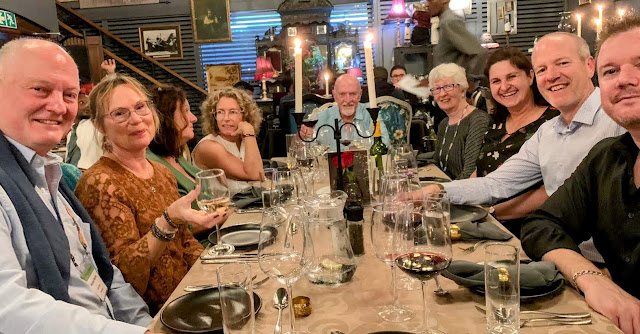November 6th was the Feast Day of St. Leonard, the patron saint of convicts. Appropriately on that day, convicted felon Donald Trump became the first president in USA history to lose a re-election bid and then come back to win a second term. He has now written himself into posterity as a significant historical figure, for good or ill. What is guaranteed is that the next four years will be one hell of a roller-coaster ride!
 |
| The Times, November 7th |
A day after the election result we were off to South Africa for Process Mineralogy '24 and Critical Minerals '24 in Cape Town, two successful events blessed by beautiful weather in the ever beautiful Vineyard Hotel.
 |
| Brazilian delegate Camila Senna showing her matching hair colour by the Vineyards's magnificent bougainvillea |
It is always a pleasure to meet new people and to catch up with old friends, no more so than our old friend Prof. Richard Williams, who I first met in 1986 in Falmouth at the first conference that I organised, a NATO Advanced Study Institute Mineral Processing at a Crossroads. Richard was then a research associate at Imperial College, just after being awarded his PhD. I have followed his meteoric career progression since then. He is now Vice-Chancellor of Heriot-Watt University in Edinburgh and has the coveted award of OBE for his services.
It was great to catch up with Richard at Critical Minerals '24, where he gave an excellent presentation, and during the farewell drinks he hosted a reception for 42 of some of the 3,900 Heriot-Watt alumni resident in South Africa. Around 40% of the current 27,000 students learn from work and home on MBAs from the University's Business School,
 |
| With Richard Williams at Groot Constantia wine estate |
Following the conferences, Barbara and I, Amanda and Jon went our separate ways. Barbara and I had a week in KwaZulu-Natal in the Drakenberg mountains (posting of 25th November), followed by a couple of nights at uMhlanga on the coast, while Amanda and her two rowing club friends spent a week in Cape Town. Jon returned home to Luxembourg in time for his weekly slot on ARA City Radio Luxembourg as a music pundit.
 |
| uMhlanga Rocks |
 |
| Cape Town |
.jpg) |
| Luxembourg |
As we were in South Africa I missed the November Cornish Mining Sundowner, but I thank Carol Richards for the photo, showing a good mix of regulars and CSM students, including CSM Union President Dani Gallagher (2nd left)
I'm not sure if they were present, but if they were it would have been good to wish regulars Nick and Flee Wilshaw a very happy retirement. having sold their business GSL (formerly Grinding Solutions Ltd) to Alfred H. Knight, a totally independent, family-owned business spanning five generations.
MEI has had a long association with GSL, sponsors of a number of MEI's comminution conferences and participants in many others. Nick graduated in mineral processing at Camborne School of Mines in 1980, and he and his wife Flee set up GSL in 2003, with Simon Bailey, now with Comminution '25 sponsor Global Met Tech, as laboratory manager. The company grew and grew, moved into new premises near Truro and developed into an innovative, consultative company specialising in mineral liberation and separation. This ambitious, family-owned business is similar to fifth-generation Alfred H. Knight and supports clients worldwide across the metalliferous, coal, industrial minerals, environmental and recycling sectors.
We will miss Nick and Flee at MEI Conferences, but they are good friends and we will maintain regular contact.
 |
The MEI team relaxing with Nick and Flee in Cape Town in 2018 |










































